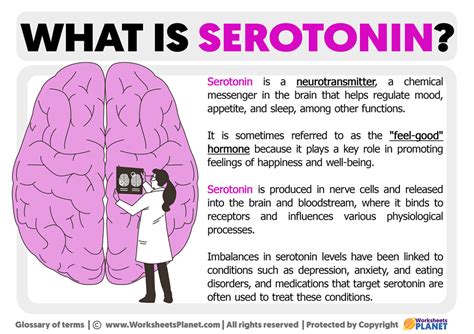Introduction

Serotonin, a crucial neurotransmitter involved in mood regulation, plays a significant role in human behavior and mental health. As an AP Psychology student, understanding the definition and function of serotonin is essential for grasping psychological processes. This article provides an in-depth exploration of serotonin, its role in the nervous system, and its implications for psychological well-being.
Serotonin: A Neurochemical Definition
Serotonin is a neurotransmitter, a chemical messenger that transmits signals between neurons in the brain and throughout the body. It is synthesized from the amino acid tryptophan and primarily produced in the intestines, brain, and platelets.
Role in the Nervous System
Serotonin’s primary role is to regulate mood, sleep, appetite, and memory. It is commonly known as the “feel-good neurotransmitter” due to its involvement in positive emotional experiences. Serotonin also plays a crucial role in:
- Appetite and Metabolism: Regulates hunger and satiety, influencing eating behavior and weight management.
- Sleep: Promotes relaxation and sleep initiation, ensuring restful sleep patterns.
- Mood: Influences feelings of happiness, contentment, and overall well-being.
- Memory: Enhances memory formation and recall, particularly in relation to emotional experiences.
- Cognitive Function: Supports attention, focus, and decision-making, contributing to cognitive performance.
Serotonin Deficiency and Disorders
An imbalance in serotonin levels can lead to various psychological disorders and conditions, including:
- Depression: Reduced serotonin levels are strongly linked to depression, a mood disorder characterized by sadness, loss of pleasure, and low self-esteem.
- Anxiety: Serotonin deficiency can contribute to anxiety disorders, such as obsessive-compulsive disorder (OCD) and generalized anxiety disorder (GAD).
- Sleep Disorders: Low serotonin levels can disrupt sleep-wake cycles, causing insomnia and other sleep disturbances.
- Eating Disorders: Serotonin imbalances can influence eating patterns, leading to conditions such as anorexia nervosa and bulimia nervosa.
Factors Affecting Serotonin Levels
Numerous factors can influence serotonin levels, including:
- Diet: Foods rich in tryptophan, such as turkey, salmon, and leafy greens, support serotonin production.
- Sunlight: Exposure to natural light boosts serotonin levels, explaining the seasonal affective disorder (SAD) experienced during winter months.
- Exercise: Physical activity releases endorphins, which stimulate serotonin production.
- Medications: Antidepressants, such as selective serotonin reuptake inhibitors (SSRIs), increase serotonin levels in the brain.
- Genetics: Serotonin levels can be influenced by genetic factors, with some individuals more prone to serotonin imbalances.
Strategies for Maintaining Serotonin Balance
To maintain optimal serotonin levels and promote psychological well-being, consider the following strategies:
- Consume a balanced diet: Include tryptophan-rich foods in your diet.
- Engage in regular exercise: Aim for at least 30 minutes of moderate-intensity exercise most days of the week.
- Get adequate sleep: Establish a regular sleep schedule and create a relaxing bedtime routine.
- Seek sunlight: Spend time outdoors, especially during daylight hours.
- Consider supplements: Consult with a healthcare professional about the potential benefits of serotonin-boosting supplements.
- Practice relaxation techniques: Engage in activities such as meditation, yoga, or deep breathing exercises to reduce stress and anxiety.
- Connect with others: Build and maintain strong social connections to provide support and enhance overall well-being.
Conclusion
Serotonin plays a vital role in regulating mood, sleep, appetite, and other psychological processes. Understanding the definition of serotonin and its function in the nervous system is crucial for AP Psychology students to grasp the complexities of human behavior. By adopting strategies that support serotonin balance, individuals can promote psychological well-being and improve their overall quality of life.
Tables
| Table 1: Factors Affecting Serotonin Levels | Table 2: Strategies for Maintaining Serotonin Balance | Table 3: Serotonin-Boosting Foods | Table 4: Serotonin-Related Disorders |
|---|---|---|---|
| – Diet (tryptophan intake) | – Consume a balanced diet | – Turkey | – Depression |
| – Sunlight exposure | – Engage in regular exercise | – Salmon | – Anxiety disorders |
| – Exercise | – Get adequate sleep | – Leafy greens | – Sleep disorders |
| – Medications (e.g., SSRIs) | – Seek sunlight | – Cheese | – Eating disorders |
| – Genetics | – Consider supplements | – Eggs | – Obsessive-compulsive disorder |
Keywords
- Serotonin
- Neurotransmitter
- Mood regulation
- Sleep
- Appetite
- Depression
- Anxiety
- Psychological well-being
